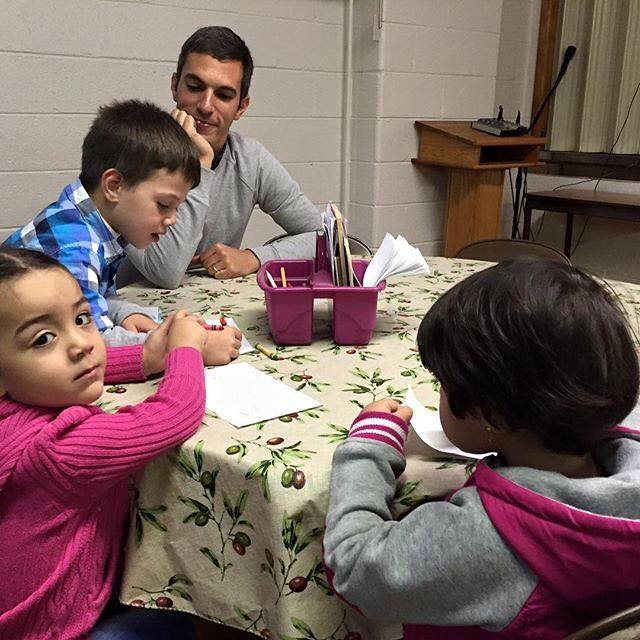By Autumn Young
Since March of this year, the Toledo area has taken in 47 Syrian refugees—a small number compared to the four million attempting to flee the violence of their country, according to Tuesday night’s panel speaker hosted by Bluffton’s Honor Capstone class.
“Our class decided to focus on the Syrian refugee crisis because we wanted to make a difference[…]as a class, we thought that investigating a way to host refugees was a great way to impact the global community,” said Ryan Johnson-Evers, a senior at Bluffton.
All students at Bluffton are required to take the capstone course their senior year and to pick an important world issue to research for the semester as a class.
Craig Miller, Dylan Mann and Appiah Adubofour presented on the history of the Syrian conflict before turning the night’s discussion over to Corine Dehabey, resettlement coordinator for U.S Together, a non-profit agency in Toledo, Ohio, that resettles and helps with the basic needs of refugees and immigrants from dozens of countries.
“The hardest thing for Syrian refugees when they come here is finding a place to live. We really need landlords to step up to this—I’ve never had a Syrian refugee not pay rent […] the minute I pick them up from the airport, they want to work, they want to earn their place here,” said Dehabey.
That could be, in part, because they’ve waited so long to get to America. It takes up to three years, according to Dehabey, for a Syrian refugee to work their way through the extensive vetting process set up by the U.S.
Despite this process, the discovery of a fake Syrian passport at the site of the Paris bombings has sparked concern across America over the security risk of letting more Syrian refugees into the U.S.
Ohio Governor John Kasich is one of 23 governors who have expressed concern over Syrian refugees entering their states.
“Overall, this crisis is a perfect example of how our own government fails to keep us safe, and I think it is appropriate for state leaders like Governor Kasich…to exercise federalism and oppose the President’s efforts until we can better understand the implication of these actions,” said Charlie Miller, student senate president at Bluffton and a volunteer field coordinator for JD Winteregg, an Ohio congressional candidate.

Syrian refugee children in the Toledo area begin their first day of school in the United States. Photo courtesy Corine Dehabey
A recent national Bloomberg poll found that 53% of Americans believe that the U.S should stop taking in Syrian refugees, and the House recently passed a bill which would make the vetting process tougher for incoming Syrian refugees.
According to a recent White House press release, Syrian refugees are subject to the most stringent security measures out of any traveler to the U.S.
“The governor of Ohio does not have the authority to block refugees from entering his state—so my agency will continue to function normally and accept Syrian refugees,” said Dehabey. “I believe in our American government. I believe in our system of security.”
Dehabey also emphasized the refugees who can afford to come to the U.S are mostly those with high degrees—doctors, lawyers and other people skilled in a particular trade.
“I view the recent response as reactionary and unfair […] closing our borders in a time of crisis is an insult to refugees who already have to live every single day with loss, insecurity, and fear,” said Evers.
Those insecurities started as early as March 2011 when peaceful protests in Syria turned violent as the country’s dictator, Bashar al-Assad, ordered bullets be fired into a crowd of demonstrators.
Events escalated as rebels formed an army to fight against their dictator and as foreign powers, like Iran and the Gulf States, joined the war; Iran providing weapons to Assad, and the Gulf States supporting the rebels.
By 2013, when Assad used chemical weapons to kill citizens indiscriminately, the U.S was backing the rebels, and Russia was backing Assad—a trend that continues today. Some of the rebels initially fighting Assad were joined by extremists, who eventually broke off from the rebels to form ISIS, creating even more violence in the area.
According to the U.N, by September of this year the war had killed over 200,000 people, and almost 30,000 of those were women, children and other civilians.
“There are no easy answers to this matter,” said Miller. “The United States is a compassionate nation and ideally ought to exhibit that compassion in this crisis…but there are a great number of immigrants here that have overstayed their visas and potentially pose a threat.”
If you are interested in finding out more about the work of U.S Together, including applying to volunteer or work as an intern, you can visit their website at http://ustogether.us/ or call (419) 469-2529.







